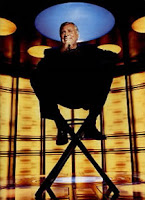 |
| Image from site |
Roddenberry unwittingly unleashed a phenomenon in which Star Trek enthusiasts became a veritable cult, numbering physicists, aerospace engineers, housewives, senators, children, teachers and intellectuals among its devotees (affectionately known as "Trekkies," and later, "Trekkers"). The show went outside television to win science fiction's coveted Hugo Award and then spawned an animated spin-off, as well as a series of feature films.
While making Star Trek, Roddenberry's reputation as a futurist began to grow. His papers and lectures earned him high professional regard as a visionary. He spoke on the subject at NASA meetings, the Smithsonian Institution, Library of Congress gatherings, and top universities.
Star Trek was so wildly popular that it has since become the first television series to have an episode preserved in the Smithsonian, where an 11-foot model of the U.S.S. Enterprise is also exhibited on the same floor as the Wright brother's original airplane and Lindbergh's "Spirit of St. Louis." In addition to the Smithsonian honors, NASA's first space shuttle was named Enterprise, in response to hundreds of thousands of letters from fans demanding that the shuttle be named after the beloved starship.
Site: Gene Roddenberry bio
Comments